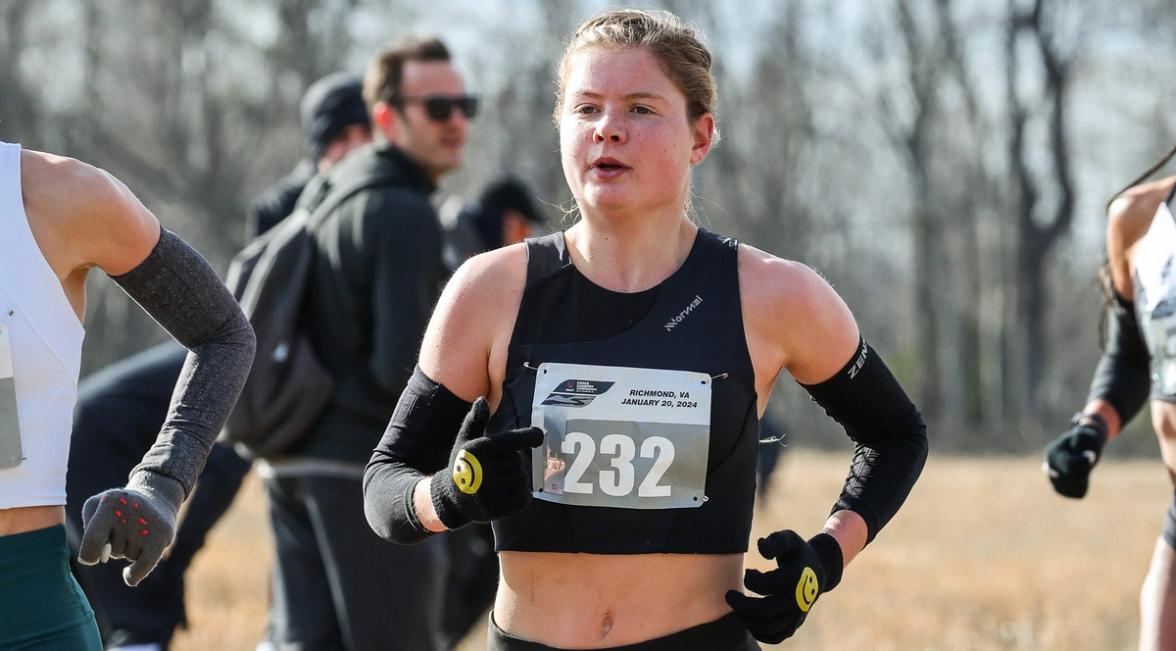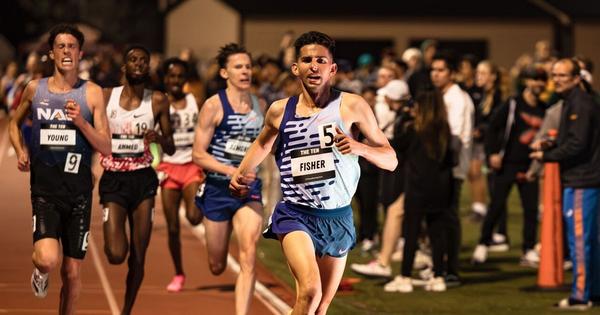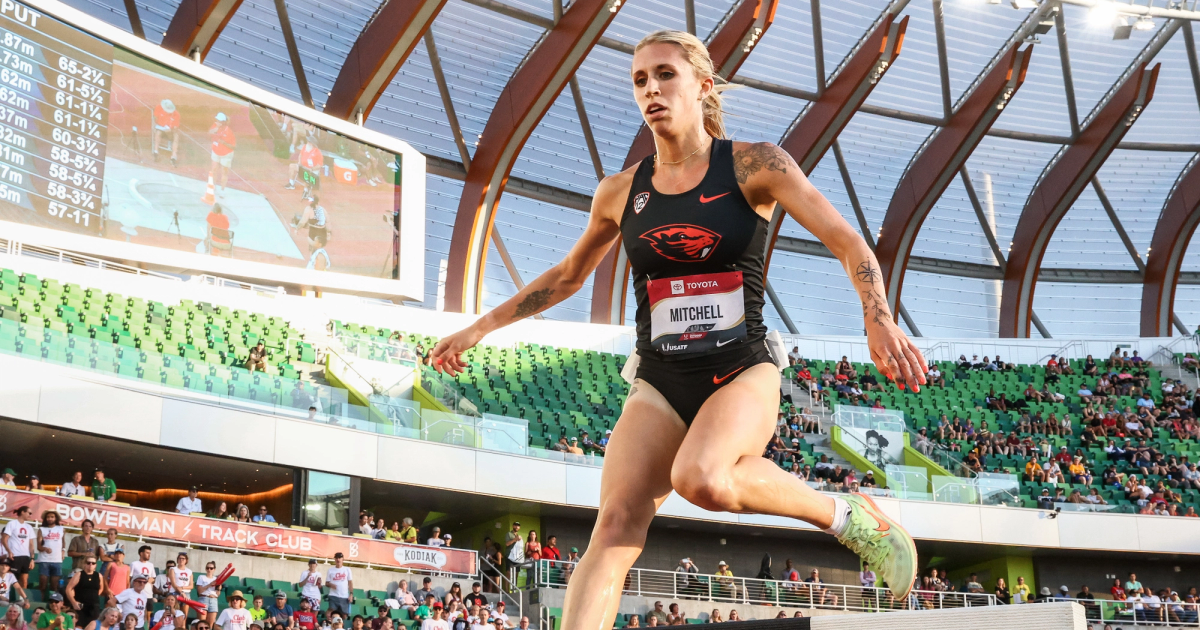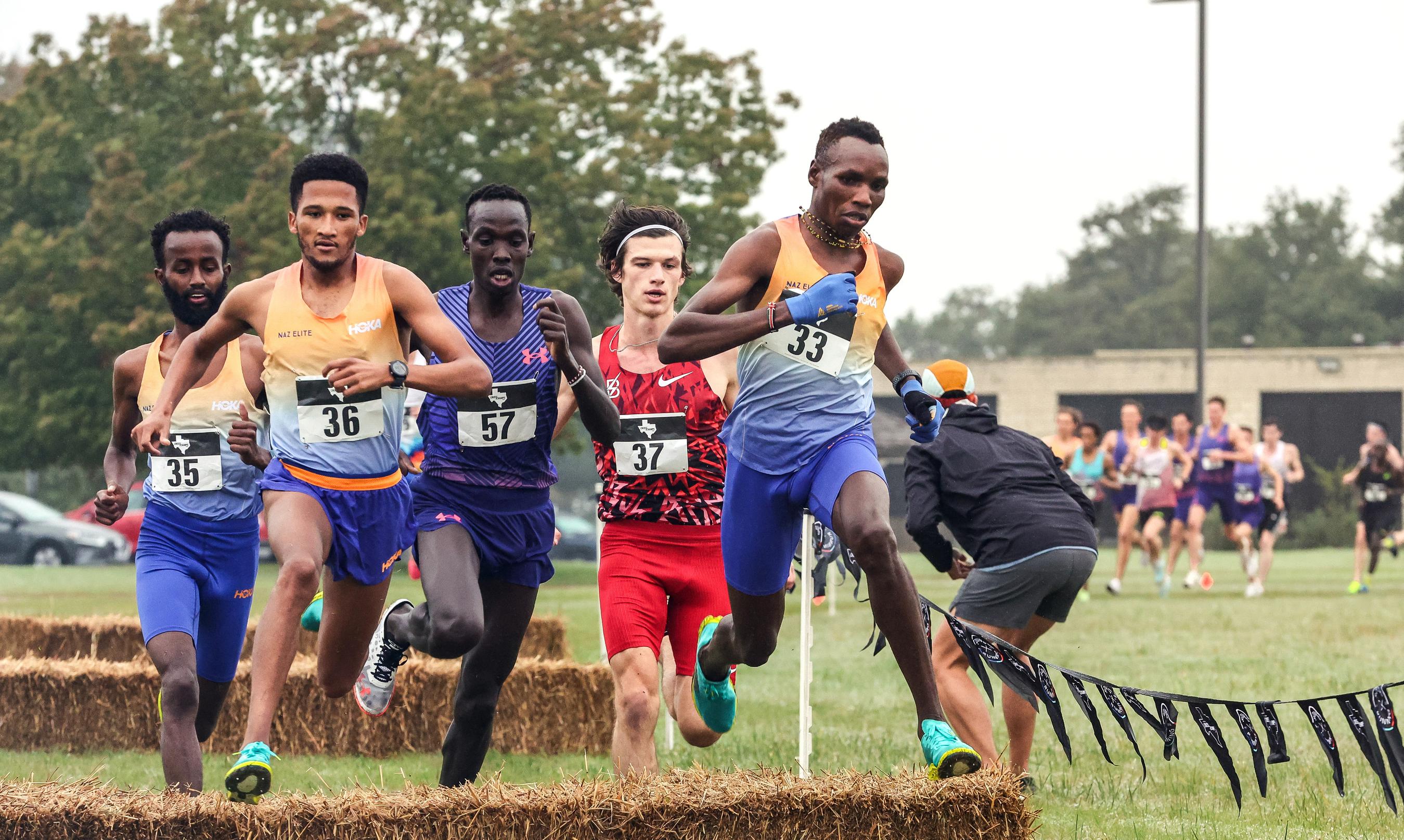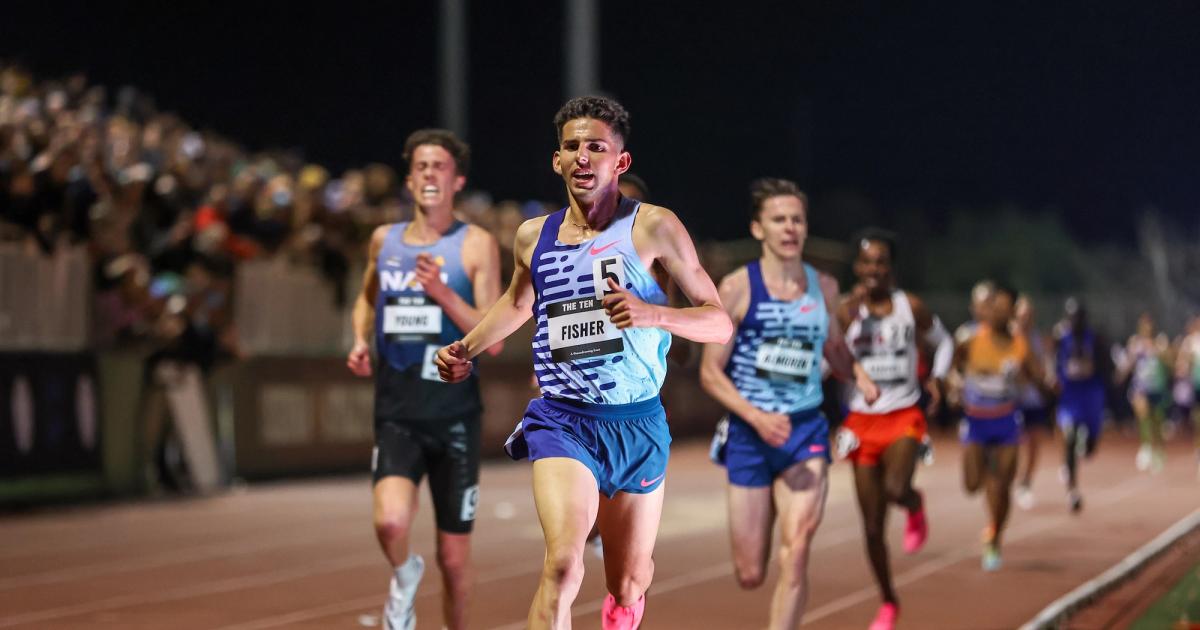By Owen Corbett
March 27, 2024
After a fourth place finish at the U.S. Cross Country Championships in Richmond back in January, former NCAA steeplechase champion Allie Ostrander is headed to her first World Championships since 2019.
Ostrander has taken time away from the track since the 2022 U.S. Outdoor Championships and has been vocal on social media about her struggle with an eating disorder and the importance of mental health. Now, Ostrander has a new coach and a new training setup, and is ready to return to the U.S. distance running scene. Before Ostrander heads off to Belgrade, Serbia, to race in the World Cross Championships on March 30th, we chatted with her about how her training is going, everything that has changed for her in the past few years, and why she feels like a new person since we’ve last seen her.
CITIUS MAG: With World Cross Country coming up this weekend, how has your build been dating back to USAs in January and beyond?
Allie Ostrander: I'm super excited. I haven't been on a U.S. team since 2019, so it's been four and a half years. Any chance to represent the US is just so exciting, especially because those opportunities are also super high levels of competition. When I go to Worlds, I'll be competing against people that I haven't had a chance to compete against for so long. I'm definitely a little bit nervous. I don't necessarily know what to expect. It's tough to have much of an idea of where I should be in the field just because I haven't competed against these people.
Training has been going pretty good. My lead up to USAs was very bad, maybe one of the worst training blocks of my career. Not that workouts were going horrible, but I was so inconsistent. I kept having little things come up and I got really sick in the middle. So the fact that the race wasn't a disaster was huge. I feel like training has been a lot better since then, and I've been more consistent with workouts and volume so hopefully that can translate for the race.
Cross training is a major part of your weekly routine. Can you lay out what a normal week of training looks like?
Monday AM: Easy run + 4-6 hill strides (20-30 seconds)
Monday PM: Easy cross-train; “What [easy cross training means] is, not doing any intervals, but I'm going at a level where my heart rate is about the same as it would be if I were running, or a little bit lower but about the same aerobic zone. The effort definitely feels higher than it would on an easy run, but theoretically I'm getting the same cardiovascular benefits.”
Tuesday AM: Speed workout (shorter hills, VO2 max, etc.) + lift
Tuesday PM: Easy cross train
Wednesday AM: 90 minute cross train
Wednesday PM: 45 minute cross train
Thursday: Easy run + strides
Friday: Long and/or threshold run; “Sometimes I'll do threshold in the middle of a long run, or sometimes I'll just have a very structured threshold workout.”
Saturday: Same as Wednesday
Sunday: Rest
What is your preferred method of cross training?
I think the best one is elliptical. I love the arc trainer but it's kind of hard to find them. When I was in college, we had one in the gym, and that was like the only thing I cross trained on, it was amazing. But any elliptical, honestly, I feel like it gets the closest to mimicking the running motion, so that's definitely what I'll opt for. I also do a lot of stationary biking because I have one in my house.
Is getting back into cross country something that excites you?
Definitely. I hadn't done cross country since college so it's something that I missed. Cross country season was always super exciting, especially from the team side of things, so it's cool to have that as an element again. And I know that last time team USA placed fifth at World Cross, so it'll be cool to try to improve upon that result.
You’ll be teammates in Belgrade with Weini Kelati who you went back and forth with a lot in college. Are you happy to be on the same team as her now?
I guess so. I don't think we ever had too intense of a rivalry in college. It was so much so a rivalry between our schools because New Mexico was [Boise State’s] biggest competition in the [Mountain West] Conference, they won it every year. But it's cool to have a familiar face on the team.
You mentioned that this is your first time running at a World Championship since 2019. How does this one feel different from Doha?
Obviously it's a different sport, so that makes it super different. But I think when I went to Doha, I was very much like, “okay, I'm here to race” and I honestly didn't really try to get to know anyone or anything. I was really intimidated by everyone because I was pretty young, and I was kind of scared to talk to my U.S. teammates. Allyson Felix is there, I'm obviously going to be intimidated!
So I don't feel like I got as much out of that experience as I could have. It's good to be focused on the race and it's the most important thing, but going into this one, I definitely am less intimidated and more confident in myself. I just want to try to actually get to know the U.S. athletes and get more out of this experience than just a race.
One of the unique parts about World Cross Country Championships is that the junior and senior championships are held alongside each other. As someone who had a lot of success as a young athlete, what advice would you give to the members of the U.S. women’s U20 team?
I never did junior races outside of Junior Mountain Running*, but my advice is to really try to soak in the experience. Get used to competing at that world level and try to embrace how challenging it is to be up against that level of competition. I think the more that you can be exposed to that starting when you're younger, hopefully when you start making senior teams, the better it is because you start to see those people not as on a pedestal, but just as your competitors. “They're people I race against, this is normal.” Then you are able to really be relaxed in that sort of an environment.
*Ostrander won the 2015 U20 World Mountain Running Championships in Wales before the start of her first collegiate cross country season
You have a very fun personality on social media, and you've been public in the past about the importance of mental health. How do you keep running fun and light and avoid the pressure that comes with being on the world stage?
I think a really big part of it is having people to run with and train with. I run and train with friends a lot, other than when I'm cross training, which helps. The other thing is to remember that, obviously running is so important, but at the end of the day, it is just running. It's just something you do, it's not who you are.
Also not having this pressure of needing to run well to have a sense of self or to have self-worth, and being able to have an identity outside of running as well. Those are some of the ways, but I also feel like it's so easy to have fun running because, personally, I love this sport, I think most of us do. It's going to be really fun as long as you can remember that a bad performance isn't going to be the death of you.
You mentioned running with friends, but your setup now is different as you are not with a team as you have been in the past. How do you compare those situations, and do you ever have the desire to return to that environment where you're training with a team?
I think that a team environment is so beneficial, especially for just the workout aspect of things, because having people to run workouts with makes the same efforts feel easier, no doubt. Now I try to scrap together someone to do a workout with me here or there, but I do have to do some of them alone. It's not like that's necessarily a problem, but it's so nice to have just a guaranteed group of people to do your workouts with.
I also think there are obviously drawbacks too though that people don't realize. When you are on a professional team, you have a lot less autonomy, you have less independence. You don't get to choose your own schedule or where you're going to be at what times of the year. Sometimes it also influences where you race, so there's pros and cons, but I definitely feel like having a group to train with would be amazing.
One of the other things that comes with training with a group oftentimes is that you're attached to a brand (Ostrander was a member of the Brooks Beasts from 2019 to 2021). Can you tell me what about the NNormal brand spoke to you and why you chose that?
The co-founder, Kílian Jornet, is someone that I definitely look up to. He's incredible as an athlete, but also as an advocate for the environment. He has these really strong ideals that he sticks to, which as a characteristic, I respect that a lot. I was honored that they were even interested. Also, it's a super new brand, and I think has a lot of potential for growth. It's cool to kind of get in on the ground level and be there through that process. Also, it being a smaller and newer brand, I as an athlete am much more valued and utilized. I'm involved in different campaigns, projects, video productions, product meetings, and sorts of things that you probably wouldn't be involved with if you're with a huge billion dollar brand.
Since you've been making this resurgence, you've done a lot of trail racing and road racing. Growing up in Alaska and running the Mount Marathon race every year (Mount Marathon is a 5k race in Seward, Alaska with over 3,000 ft of elevation gain, Ostrander won the junior race six consecutive years from 2009-2014), did you know that trail racing as a professional was something that you wanted to do? Did it have a stronger draw than racing on the track?
I think I always considered track more of the serious side. I took trail racing super seriously when I was younger, but I guess until I saw Kílian and Emelie [Forsberg] – the co-founder of NNormal and Kílian’s partner – run Mount Marathon when I was younger I didn't really understand that trail running was a professional sport. I thought people did it, but it wasn't a career. That was the first time I really understood that it was a career, but at that point I was already going to do track in college, so I was automatically thinking that I'm definitely going to be more of a track runner. But I always had a spot in my heart for trail running, so when the opportunity came up to do that, I jumped on it.
You've said you have plans of returning and running some track races this year. Being an Olympic year, is your goal to make it back to the Trials and give it another shot at an Olympic team?
The plans are not concrete yet, so not positive on that front. I'm finalizing things with my coach and NNormal, but obviously the temptation is definitely there because it is an Olympic year and everyone knows people care a hundred times more about track during an Olympic year.
What do you think you could draw from your previous Olympic Trials experiences? Not a lot of people might remember that just after your freshman year you ran your first trials at only 19. What can you take from those past experiences, if you do choose to go after that again this year?
Having Olympic trials under my belt is kind of what I was saying about having world competitions under your belt. It's just so good to have the experience because you truly cannot understand what it feels like to compete at the Olympic Trials until you do it. It's such a highly charged environment, with such stress and it's the most nervous I ever got for races in my life. I've never been there in a position where I really, truly thought, “I'm gonna make this team,” and it's still just such a nerve wracking experience. I think the stakes are so high and everyone's so serious. For most people, this is the focus of not just the year but of the last four years. It's crazy. I think it's good going into this one that I know what to expect and I can be mentally prepared for that.
As you're returning to the U.S. stage and the world stage, what do you think makes you a different runner now than the last time a lot of people may have seen you racing in 2022?
I've done a lot to improve both my mental and physical health, and I think that's also taught me so much about myself and really changed me. I feel like everyone says “I'm a new person now,” I know it sounds cheesy to say it, but I do feel like I'm a different person than I was. I have a much different perspective on not just myself, but also on the sport. I have a different coach who has a different philosophy. My training is different. Honestly, it'd be easier to answer what's the same than what has changed because I feel like it's so much.
How is the relationship going with your new coach?
My coach is David Roche, he is kind of a specialist on the trail side, but he also coaches road and track runners. He and his wife Megan have this podcast called “Some Work, All Play” and they do a deep dive on the science side of running, but also have a bunch of humor in it. It's amazing. He offered to coach me when I started doing trails last fall, and I was super into it because I know that he has a very scientific approach, but at the same time, he's like the Ted Lasso of the running coaching world. He's so positive and just very strongly believes in the power of positive thinking, in the power of self-belief and self-efficacy. He's always instilling that belief in myself, and I appreciate it so much because I've never had a coach before that was super positive and encouraging. I’m not like trying to shit on my other coaches, but that is a particular coaching style, and I've never had that before. It is so empowering. I'm like, “wow, he really thinks I'm great,” and it just makes me feel so good.
You've had a lot of big wins in your career. What is your favorite? And if it's not a win, what is your favorite race that you've run?
My favorite race actually was the Olympic Trials in 2021. In the final of the steeplechase, I got eighth which is not incredible or anything, but I almost did not even start that race because I was so nervous and so convinced that I did not belong there, that I was not good enough to be on that line, that I couldn't perform. And so actually getting myself to the line and to PR in that race and get eighth. I was just so proud of myself.
I want to give you a chance to brag about Seattle as a running city, because it's not one of the first ones that people think of, but I know it's got a pretty good running culture.
I think [the University of Washington] is doing a good job making people believe in Seattle's running scene a little bit more with all their milers. It's a good running city. I think that if it were at altitude, then it would probably be a very popular training spot. Probably the fact that it's at sea level just brings it down… like the highest it could be for running would be like a seven out of ten. But it's probably like a six and a half because there are really good trails, a lot of soft surface. Tracks are generally open to the public and they're pretty easy to get on. It's close to some really great trail running and mountains too if that's something that you're interested in. I think it's good. If it were at altitude it would be like a nine.
Last question, you feature a lot of your cooking on your Instagram. What's your favorite thing that you've made lately?
I made these really good little protein bites yesterday. It was just protein dough covered in white chocolate, and they were so good. They kind of remind me of Reese's Eggs, but the protein version. So those were really good.
Thanks for giving us the time to sit down and talk, we are very excited to see how you do at World Cross!
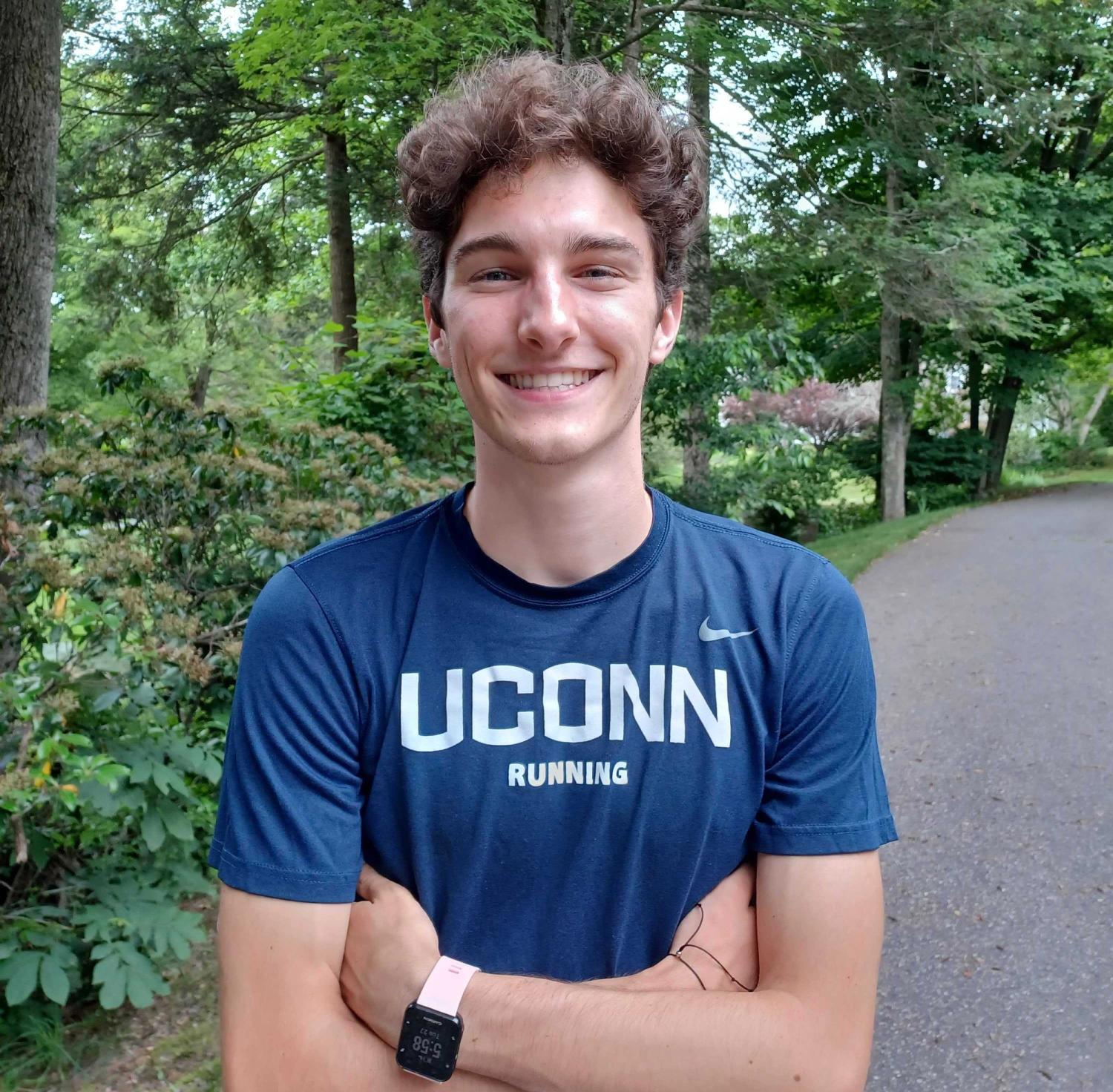
Owen Corbett
Huge sports fan turned massive track nerd. Statistics major looking to work in sports research. University of Connecticut club runner (faster than Chris Chavez but slower than Kyle Merber).
